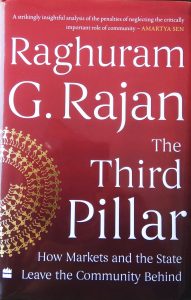Bhaskar Parichha

Any book by Raghuram Rajan is a marvel. In his latest book, ‘The Third Pillar: How Markets and the State Leave the Community Behind’, Rajan talks about a blind spot in economics: the community. This is one area where we fail to exercise judgment. Three important players are dealt with in the book: state, the market and the community. His basic argument is that the focus of research in economics all along has been on the connection between the state and the markets, whilst the community has been mostly ignored. Raghuram dissects the whole understanding and explains why things have gone wrong here and everywhere else.
The book basically looks at capitalism, democracy and their ills. Rajan, former governor of the Reserve Bank of India and who presently teaches at the University Of Chicago Booth School Of Business, brings his unequaled knowledge and experience to slice up the dilemma. History’s best guide to a market economy , this treatise is a gleaming and prophetic analysis of the current populist recoil against globalization and offers a clue about how revitalizing the community can save liberal market democracies from failure.
The ‘third pillar ‘or society – crux of Rajan’s book – is as important as the market and government. So, leaving social issues is not just narrow-minded, it’s perilous. If economics is all about socioeconomics and all markets are ‘embedded in a web of human relations, values and norms’, community can never be overlooked.
As a social science, economists cannot close their eyes to the collective aspects of the society that are critical for development, progress, equity and justice.Rajan’s point is that the civil society has a larger role to play vis-à-vis the relationship of the state. Subsequently, he delves into the humanitarian part of development.
Rajan delineates the concept of civic or liberal nationalism. Civic nationalism is a form of self-government propounded by those political philosophers who believe in an inclusive form of nationalism that adheres to traditional liberal values of freedom, tolerance, and equality.Rajan’s therapy of civic nationalism is that it cannot be prescribed by law or imposed from above. It has to evolve by choice. Rather than trying to create artificial communities defined by civic nationalism, the focus should be on strengthening the state, its institutions, and the markets – a phenomenon which we are witnessing in India.
As he shows in the book, throughout history, technological innovations have cut up the market and led to violent backlashes. He, therefore, offers a magnificent framework for understanding how three key forces – the economy, society, and the state – interact, why things begin to break down, and how we can find our way back to a more secure and stable plane.

In Preface of the book, Rajan says, ‘we are surrounded by plenty. Humanity has never been richer as technologies of production have steadily over the last two hundred and fifty years. It is not just the developed countries that have grown wealthier; billions across the world have moved from stressful poverty to a comfortable middle-class existence in the span of a generation. Income is more evenly spread across the world than any other time in our lives. For the first time in history, we have it in our power to eradicate hunger and starvation everywhere.’
But there is ‘both promise and peril in our future. The promise comes from new technologies that can help us solve our most worrisome problems like poverty and climate change….The peril lies not just in influential communities not being able to adapt and instead impending progress but also in the kind of society that might emerge if our values and institutions do not change as technology disproportionately empowers and enriches some.’
In Rajan’s point of view, successful democracies require balance between competitive markets, honest governments, and healthy local communities. But communities have been ravaged by globalization and ICT. Restoration of the third pillar is therefore the most essential task facing policymakers today. But he cautions that the ‘new equilibrium could be ugly and messy if done in the wrong way.’
Raghuram Rajan, author of ‘Fault Lines: How Hidden Fractures Still Threaten the World Economy’, has a matchless vantage point on the social and economic consequences of globalization and their ultimate effect on politics and society. The book has an agenda-setting role across the world.
The book is divided into three chapters. Part one is all about the history of the three column structures – state, market and community – and how they emerged. Part two is about the imbalances that have set in and the last chapter is about how to restore the balance.
Besides the US and Europe where most of the author’s erudition takes place, the book has a reference to China and India as well. Calling India a ‘vibrant but chaotic democracy’, he has a couple of prescriptions for the motherland: thin files instead of the thicker ones meaning fewer bureaucracy , more competitive private sector with higher public status, more medium and small enterprises, more liberalization and more market-orientation.
In the sub-chapter ‘The Threat of populist Nationalism’, Rajan has a veiled criticism of the RSS and warns that the majoritarian Hindu leaders are a ‘serious threat to a liberal tolerant innovative India.’
Despite all the fault lines, Rajan is hopeful of a bright future for the community when he says, in the epilogue, ‘we cannot afford self-interested, zero-sum nationalism if the fate of the world is in question. Instead, we need responsible internationalism. By weakening our propensity for jingoistic nationalism, inclusive localism will allow us to embrace responsibility as a nation.’
Each sentence in this 450- page book is a gem. Written articulately and effectively, the approach of this worldwide study is vivacious. Rajan being an important economic thinker of our time, his ideas is fairly and relatively upfront. ‘The Third Pillar’ is a must read for everyone who seeks a way to preserve democracy.
‘The Third Pillar’
Raghuram G. Rajan
HarperCollins Publishers
A-75, Sector-57,
Noida-201301
Rs 799
2019





















